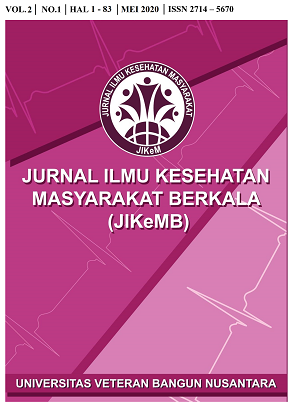Hubungan Pengetahuan dengan Praktik Perawatan Diri pada Pasien Diabetes Mellitus Tipe 2 di Surakarta
DOI:
https://doi.org/10.32585/jikemb.v2i1.812Keywords:
pengetahuan, praktik perawatan diri, diabetes mellitus tipe 2Abstract
Penelitian ini bertujuan untuk mengetahui hubungan pengetahuan dengan praktik perawatan diri pada pasien diabetes mellitus tipe 2 di Surakarta. Penelitian ini merupakan observational analitik dengan desain penelitian cross sectional. Penelitian ini di lakukan di Kota Surakarta dari bulan Juni hingga Juli 2019. Sebanyak 200 pasien diabetes mellitus tipe 2 di pilih dengan menggunakan teknik simple random sampling. Variabel dependen dalam penelitian ini adalah praktik perawatan diri. Variabel independen dalam penelitian ini adalah pengetahuan. Data praktik perawatan diri pengetahuan diperoleh dengan menggunakan kuisioner. Data yang diperoleh dianalisis menggunakan chi square. Hasil analisis menunjukkan terdapat hubungan antara pengetahuan dengan praktik perawatan diri pada pasien DM tipe 2 dan ada hubungan secara statistik signifikan (OR= 5.58; CI 95%= 3.03 hingga 10.28; p<0.001). Pasien DM tipe 2 dengan pengetahuan tinggi mempunyai peluang untuk melakukan praktik perawatan diri yang lebih baik 5.58 kali daripada pasien DM tipe 2 dengan pengetahuan rendah.
Downloads
References
Dedefo, M. G. et al. (2019) ‘Self-care practices regarding diabetes among diabetic patients in West Ethiopia’, BMC Research Notes. BioMed Central Ltd., 12(1), p. 212. doi: 10.1186/s13104-019-4258-4.
Dinesh, P., Kulkarni, A. and Gangadhar, N. (2016) ‘Knowledge and self-care practices regarding diabetes among patients with Type 2 diabetes in Rural Sullia, Karnataka: A community-based, cross-sectional study’, Journal of Family Medicine and Primary Care. Medknow, 5(4), p. 847. doi: 10.4103/2249-4863.201176.
Hailu, F. B., Moen, A. and Hjortdahl, P. (2019) ‘Diabetes self-management education (DSME) – Effect on knowledge, self-care behavior, and self-efficacy among type 2 diabetes patients in Ethiopia: A controlled clinical trial’, Diabetes, Metabolic Syndrome and Obesity: Targets and Therapy. Dove Medical Press Ltd., 12, pp. 2489–2499. doi: 10.2147/DMSO.S223123.
International Diabetes Federation (IDF) (2017) Eighth edition 2017, IDF Diabetes Atlas, 8th edition. doi: http://dx.doi. org/10.1016/S0140-6736(16)31679-8.
Kassahun, T., Eshetie, T. and Gesesew, H. (2016) ‘Factors associated with glycemic control among adult patients with type 2 diabetes mellitus: a cross-sectional survey in Ethiopia’, BMC Research Notes, 9(1), p. 78. doi: 10.1186/s13104-016-1896-7.
Kementerian Kesehatan Republik Indonesia (2018) ‘Tahun 2030 Prevalensi Diabetes Melitus Di Indonesia Mencapai 21,3 Juta Orang’, www.depkes.go.id. doi: 10.1145/2818346.2820736.
Kugbey, N., Oppong Asante, K. and Adulai, K. (2017) ‘Illness perception, diabetes knowledge and self-care practices among type-2 diabetes patients: A cross-sectional study’, BMC Research Notes. BioMed Central Ltd., 10(1). doi: 10.1186/s13104-017-2707-5.
Shrivastava, S. R. B. L., Shrivastava, P. S. and Ramasamy, J. (2013) ‘Role of self-care in management of diabetes mellitus’, Journal of Diabetes and Metabolic Disorders. Springer, p. 14. doi: 10.1186/2251-6581-12-14.
Downloads
Published
How to Cite
Issue
Section
License
An author who publishes in the Jurnal Ilmu Kesehatan Masyarakat Berkala (JIKeMB) agrees to the following terms:
- Author retains the copyright and grants the journal the right of first publication of the work simultaneously licensed under the Creative Commons Attribution-ShareAlike 4.0 License that allows others to share the work with an acknowledgement of the work's authorship and initial publication in this journal
- Author is able to enter into separate, additional contractual arrangements for the non-exclusive distribution of the journal's published version of the work (e.g., post it to an institutional repository or publish it in a book) with the acknowledgement of its initial publication in this journal.
- Author is permitted and encouraged to post his/her work online (e.g., in institutional repositories or on their website) prior to and during the submission process, as it can lead to productive exchanges, as well as earlier and greater citation of the published work (See The Effect of Open Access).
Read more about the Creative Commons Attribution-ShareAlike 4.0 Licence here: https://creativecommons.org/licenses/by-sa/4.0/.










